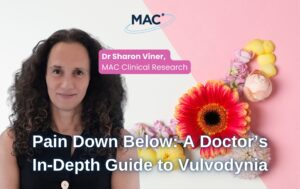Living with Obsessive-Compulsive Disorder (OCD) can be an intricate and overwhelming experience. As individuals with OCD strive to convey the complexity of their thoughts and behaviours to others, they often turn to metaphors.
Metaphors are a powerful tool which allow them to create vivid imagery, helping both themselves and those around them to better understand their individual obsessions and compulsions that can take over their daily lives.
OCD is a mental health condition characterised by intrusive, unwanted, and repetitive thoughts, images, or urges (obsessions) that lead to repetitive behaviours or mental acts (compulsions) that help to temporarily reduce the anxiety associated with the obsessions.
It’s estimated that around 12 in every 1,000 people in the UK are affected by OCD: almost 750,000 people1.
In a recent YouTube video series by the biotech company Biohaven, people living with OCD were asked about their experience living with the condition2. As the interviewees describe their journeys, they often use metaphors to visualise how they cope and how the condition impacts their lives.
Tia, one of the interviewees living with OCD, describes her OCD as a ‘backseat driver.’ She said: “Before, OCD was driving the car, and I was along for the ride. And now, OCD is this obnoxious little toddler in the back seat who kicks my chair, and tells me which way to go, but at the end of the day, it doesn’t get to touch the wheel. I’m not going to stop my trip, and I’m going to go where I want.”
By using this metaphor, Tia is able to communicate that her condition does not control her.
In another interview, another OCD patient Harrison, describes his intrusive thoughts, which can lead to compulsions, and the danger of relying on other people to justify and enable them. He compares this to a snowball. He says: “Everything snowballs in OCD, so you have to just not pick up the snow! You have to just let it be! Let the snow hit the ground…and just don’t pick it up.”
Here at MAC, we are committed to improving the quality of life for people living with OCD and creating safe environments where non-judgemental and objective discussions can happen between trained healthcare professionals and people living with OCD.
We are currently investigating a medication that is thought to target a different signalling pathway in the brain to current OCD treatments, which may help to control obsessive or compulsive behaviours. With your participation, you may be able to contribute to scientific research, which may lead to a new medicine to help people living with OCD.
The trial is taking place at MAC clinics in Lancashire, Greater Manchester, Merseyside, South Staffordshire, South Yorkshire, Teesside, and West Yorkshire.
To be eligible, you must:
- Be aged between 18 and 65 years old.
- Have had OCD or OCD symptoms for at least 1 year.
- Feel that your current OCD medication (antidepressant) is not fully working.
Eligible participants will receive up to £490 for their time and commitment to the study, along with reasonable travel costs. If the treatment works, you may be allowed to continue taking it (open-label extension) for up to 48 weeks.
For more information on how you can get involved, visit our OCD Research page.
1 NHS Inform – Obsessive compulsive disorder (OCD)
2 Biohaven YouTube – OCD Playlist




